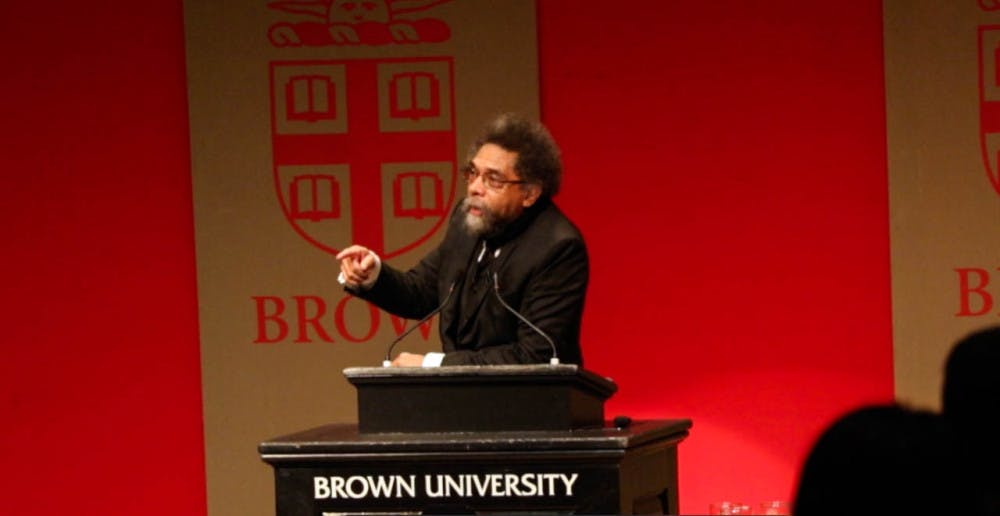At Tuesday’s event, Cornel West spoke with conviction and compassion, demonstrating care for his audience. Even as the event reached its scheduled end, he remained committed to speaking to every audience member who had a question for him. “I just want to revel in your humanity no matter what,” he said.
The Cogut Institute for the Humanities brought the philosopher, political activist and public intellectual to the Salomon Center yesterday as a part of its Politics in the Humanities lecture series.
West was introduced by Kristen Maye GS and Felicia Denaud GS, who are both in the Africana studies department. In Maye’s introductory statement, she said that West has “set a standard for unbridled truth telling,” adding that “West is never at rest, and neither is the black radical tradition.”
The lecture was deeply rooted in a pervasive sense of humanity. “I am who I am because somebody loved me, somebody cared for me, somebody attended to me, someone was concerned with my trajectory in life, my pilgrimage,” West said.
His lecture compelled the consideration of existential questions and how they could be woven into interdisciplinary approaches to politics and the humanities. He asked, “What kind of human being are you going to choose to be? What kind of virtues and visions and values will you enact and embody in the short time that you are in space and time?”
West cited James Baldwin, William Shakespeare, Anton Chekhov, Ludwig van Beethoven and Dinah Washington as “towering figures in humanity,” each differentiated by a willingness to, in an existential sense, “wrestle with what it means to be human,” to “probe at the deepest level of their souls.”
West also discussed the nature of our educative experience. He defined the Greek term “paideia” as a “deep education” about “learning how to die.” West explained the notion of “learning how to die” as a form of critical self-examination that is necessary for maturation and growth. The process requires “letting go of certain assumptions and presuppositions, certain dogma and doctrines, that no longer facilitate your quest toward maturity, … your quest toward a more critical view of the world,” he added.
People can miss out on paideia when they are too caught up in quotidian chores and, consequently, forget about their life goals, West said. In this vein, he criticizes society’s prioritization of material gain. “Success is one thing, greatness is something else. … Freedom is something else,” he said.
He addressed university culture and asked students to think about “what went through you” while navigating campus life, prompting careful thought on their experiences and growth. In doing so, West also highlighted a crucial distinction between intellect and wisdom. “I am highly suspicious of the cult of smartness. Let the phones be smart, we need to be wise. We need to have compassion,” he said.
On the subjects of current affairs and historic injustice, West examined the world from the same lens of compassion. “Truth means the condition of suffering must speak,” he said. He cited issues of colonization, discrimination, slavery and racial violence, among other “catastrophes.”
According to West, “catastrophes” are often simplified as “problems,” which is subversive and harmful. “There is no such thing as a race problem in the history of the American empire. There are catastrophes that have been visited on black people and red people. As soon as you reduce the catastrophic to the problematic, you’ve already sanitized the issue,” he said.
West asserted the necessity of acknowledging the value of every life that has been harmed. “Where is the delicate, difficult discussion that keeps track of the humanity of each and every one of us?” he asked.
Toward the end of the lecture, West said that being a young person now means living within a convergence of nuclear, ecological, economic, political, civic and spiritual catastrophe. “We’re in a bleak moment now, where we will discover who we really are,” he added.
West is currently a professor of the practice of public philosophy at Harvard and is a significant voice in the discourse regarding race, class, gender, politics and religion in American society. A prolific author and academic, West has written 20 books and edited 13 in his career. Of these, he is most well known for his titles “Race Matters” and “Democracy Matters.” The religious studies department also offers a course in West’s name, RELS 0835: “Edward Said and Cornel West,” which explores West’s thought and influence in contemporary discourse.
This will be the sixth lecture in the PITH series, which aims to “open up dialogue on political questions across the humanities and the social science,” according to the Cogut Institute website.
West’s intersectional approach is in line with what the lecture series as a whole would like to bring to the campus. “He exemplifies what Politics in the Humanities is trying to vivify at Brown: a conscientious and inspiring approach to philosophical and theological sources that can open our eyes to injustice and point us in a better direction or toward better possibilities,” said Bonnie Honig, professor of modern culture and media and political science, in a press release.





